The journey to a serene scalp often feels like a winding path, filled with products and promises, yet the deepest comfort might lie not in what we apply, but in how we live and nourish our bodies. Roothea understands this quiet yearning for well-being that begins from within. The scalp, that often-overlooked landscape beneath our strands, serves as a sensitive barometer of our internal state. Its comfort, or lack thereof, whispers stories of systemic balance or subtle discord.
Can our daily diet and the choices we make in our living truly affect this intimate space? The answer, as we will discover, is a resounding yes, in ways more profound and interconnected than one might initially suppose.
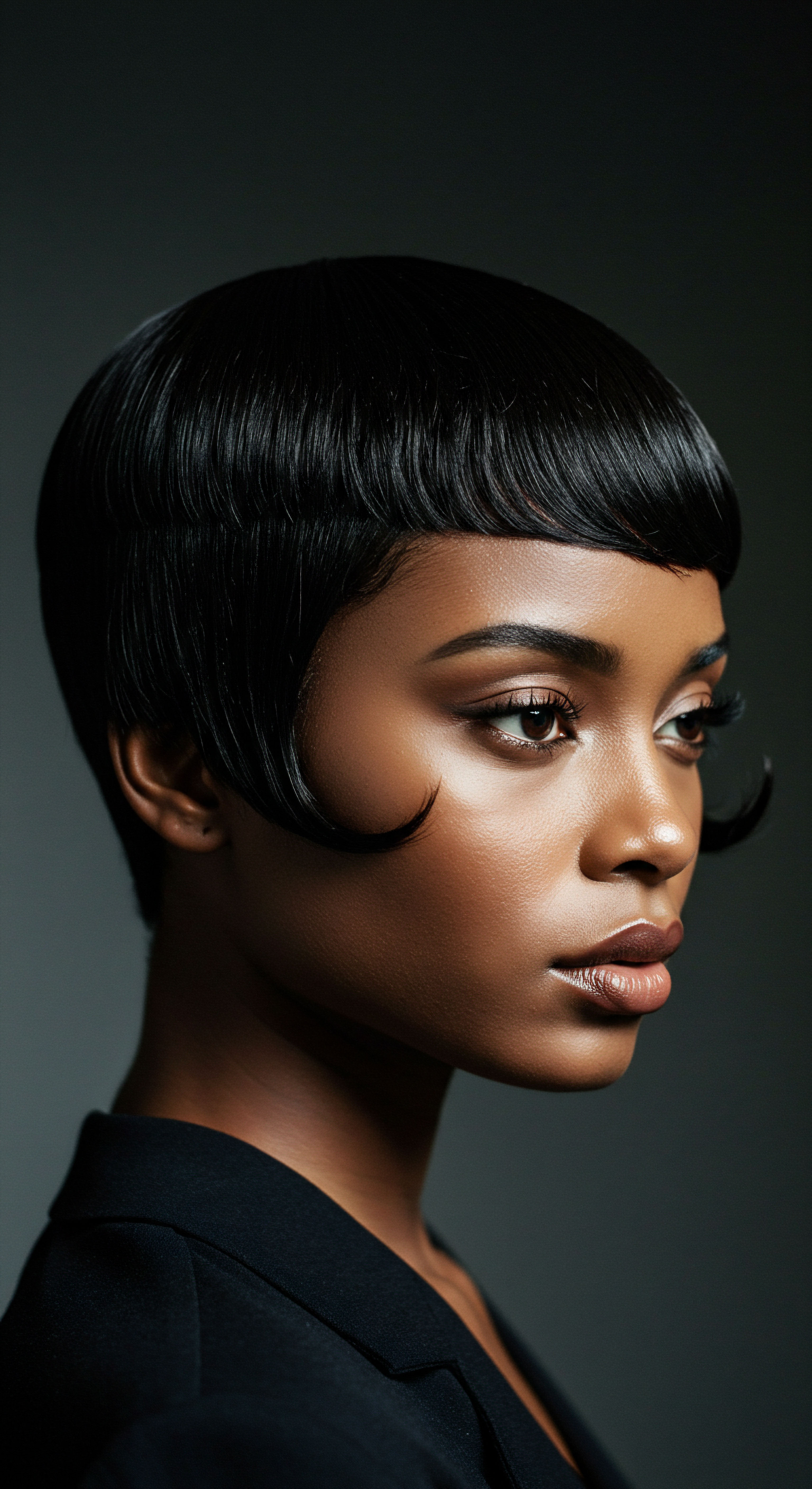
Roots
The foundation of any vibrant garden lies in its soil, and for our hair, that fertile ground is the scalp. It is here, in this delicate skin, that the origins of our strands reside, deeply affected by the nourishment we offer our entire being. Our diet and lifestyle choices are not merely surface-level concerns; they are the fundamental elements that dictate the well-being of this crucial epidermal layer. The story of scalp comfort, then, begins with understanding these deep connections, moving beyond immediate sensations to the underlying biological narratives.
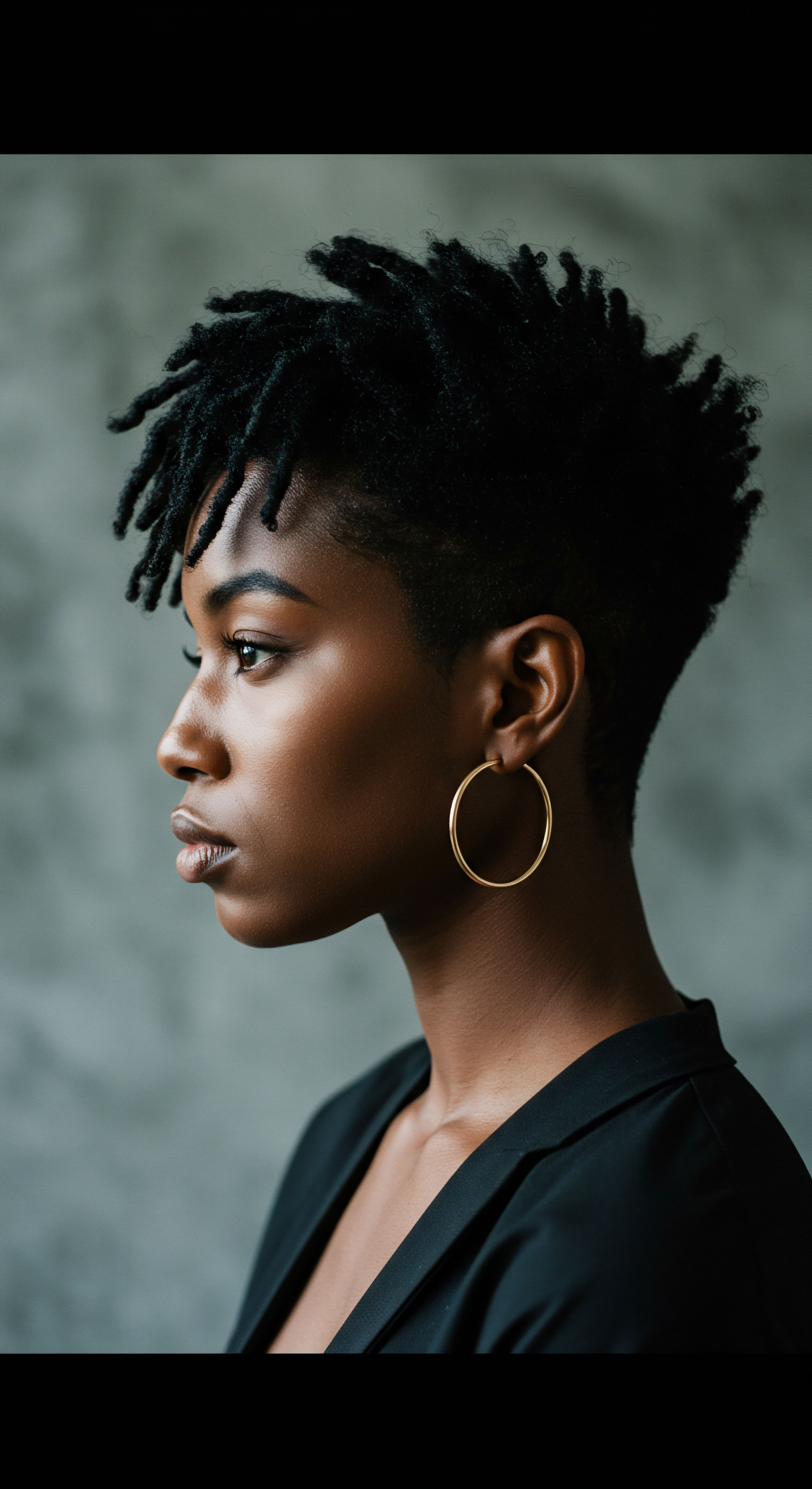
The Scalp as a Living Ecosystem
The scalp is a dynamic environment, home to a diverse community of microorganisms, including bacteria and fungi. This intricate microbial community, often called the scalp microbiome, plays a significant role in maintaining scalp health. When this balance is disturbed, various scalp issues can arise, such as dandruff, hair thinning, and irritation.
Factors like sebum production, moisture levels, and pH all contribute to the unique conditions that support this microbial life. An imbalance in this ecosystem can compromise the skin’s barrier function, making the scalp more vulnerable to external irritants and inflammation.
The scalp, much like a hidden garden, thrives when its underlying ecosystem is in balance.
Consider the natural oils, or sebum, produced by the sebaceous glands on the scalp. Sebum is essential for moisturizing and protecting the scalp and hair. However, both too much and too little sebum can lead to problems. An oily scalp, for instance, can result from excessive sebum production, often influenced by hormonal shifts, dietary patterns, or even genetic predispositions.
Conversely, insufficient sebum can result in a dry, flaky scalp. A diet rich in processed foods, unhealthy fats, and sugars can contribute to excess oil production, while healthy fats, like omega-3s, and vitamins A and E can support balanced sebum levels.

The Language of Nutrient Deficiencies
Our bodies are complex biochemical machines, and every process, including the health of our scalp and hair, relies on a steady supply of specific nutrients. When certain vitamins or minerals are lacking, the scalp often sends signals. These deficiencies might not always manifest dramatically, but rather as subtle shifts in comfort, texture, or appearance.
- Iron ❉ A deficiency can lead to decreased oxygen supply to hair follicles, potentially causing hair to thin and shed more easily.
- Vitamin D ❉ This vitamin is crucial for hair follicle cycling and growth phases. Low levels can contribute to diffuse thinning across the scalp and even premature graying.
- Biotin ❉ Known as vitamin B7, biotin supports keratin production. Its deficiency can result in alopecia and brittle strands.
- Omega-3 Fatty Acids ❉ These essential fats possess anti-inflammatory properties, which can aid in reducing scalp inflammation and promoting healthy hair growth.
The impact of these nutritional gaps extends beyond just the hair strands; they directly influence the underlying scalp health. For example, a lack of vitamin D can weaken the immune system, potentially leading to conditions like alopecia areata, an autoimmune disorder that causes hair loss, and adequate vitamin D levels may help reduce inflammation in hair follicles and the scalp.

What Does a Healthy Scalp Need to Thrive?
A healthy scalp is characterized by balanced moisture levels, an absence of excessive oiliness or dryness, and a proper pH. Common scalp problems, such as dandruff, itchiness, and irritation, can often be linked to poor diet and nutritional deficiencies. To foster a thriving scalp, a balanced intake of specific nutrients becomes paramount.
| Nutrient Category Omega-3 Fatty Acids |
| Primary Benefit for Scalp Reduces inflammation, supports hydration |
| Examples of Dietary Sources Fatty fish, chia seeds, walnuts |
| Nutrient Category Antioxidants |
| Primary Benefit for Scalp Combats oxidative stress, improves circulation |
| Examples of Dietary Sources Berries, dark chocolate, leafy greens |
| Nutrient Category Vitamins A and C |
| Primary Benefit for Scalp Sebum production, collagen synthesis, circulation |
| Examples of Dietary Sources Carrots, bell peppers, sweet potatoes |
| Nutrient Category Biotin (Vitamin B7) |
| Primary Benefit for Scalp Supports keratin production, prevents hair loss |
| Examples of Dietary Sources Eggs, nuts |
| Nutrient Category Zinc |
| Primary Benefit for Scalp Regulates hormones, supports immune function |
| Examples of Dietary Sources Oysters, red meat, beans |
This table offers a glimpse into the foundational elements our scalp craves. By understanding these core requirements, we begin to appreciate the intricate dance between what we consume and the comfort experienced at our roots.
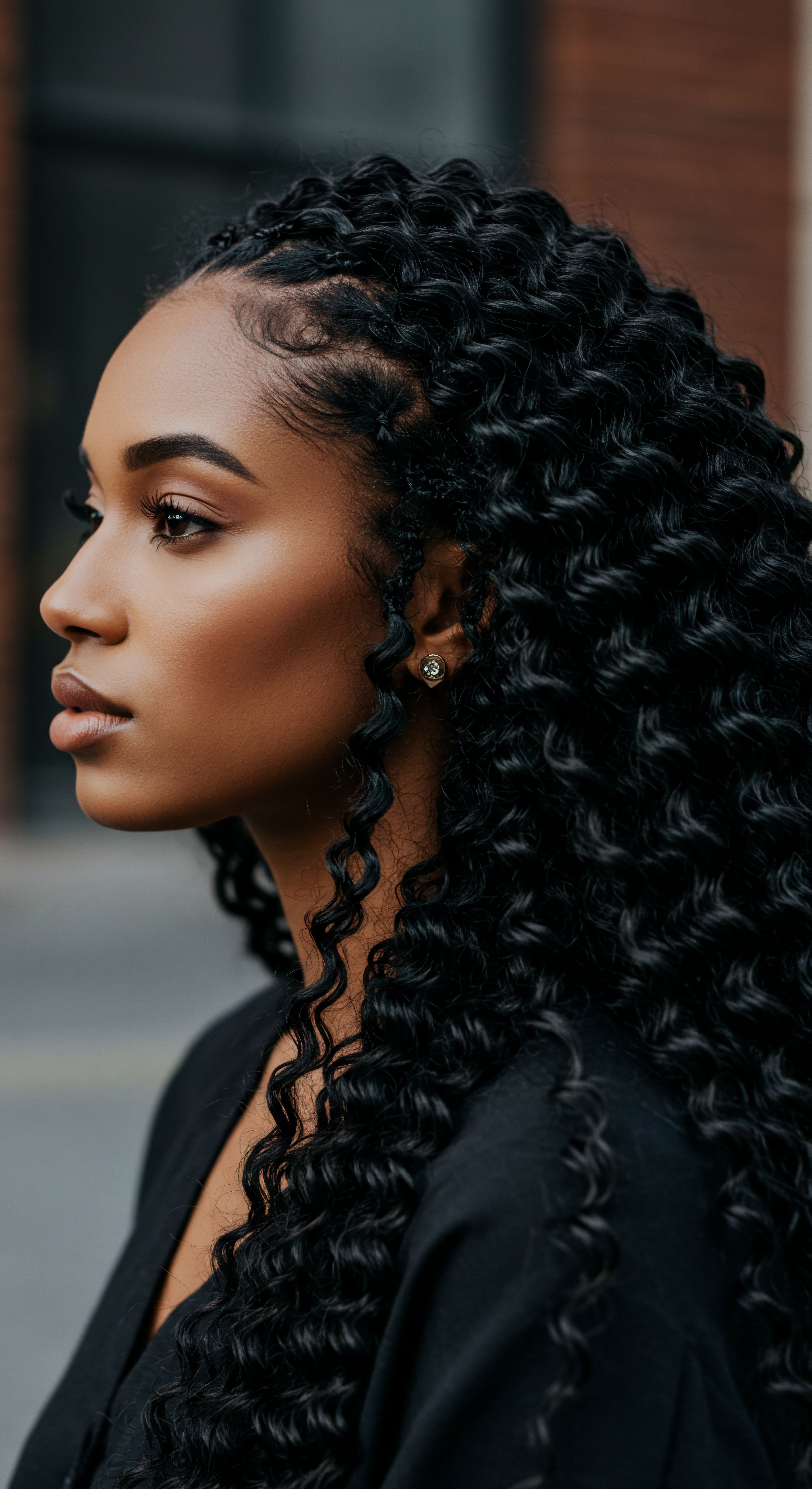
Ritual
Beyond the fundamental understanding of scalp biology, the daily practices and routines we cultivate shape our scalp’s reality. These rituals, both conscious and unconscious, translate the internal landscape of our bodies into tangible experiences of comfort or discomfort. It is within these regular rhythms that diet and lifestyle choices find their practical expression, influencing everything from how our scalp feels after a wash to its long-term resilience. We move now from the elemental to the applied, exploring how intentional choices can transform routine into a nurturing experience for the scalp.
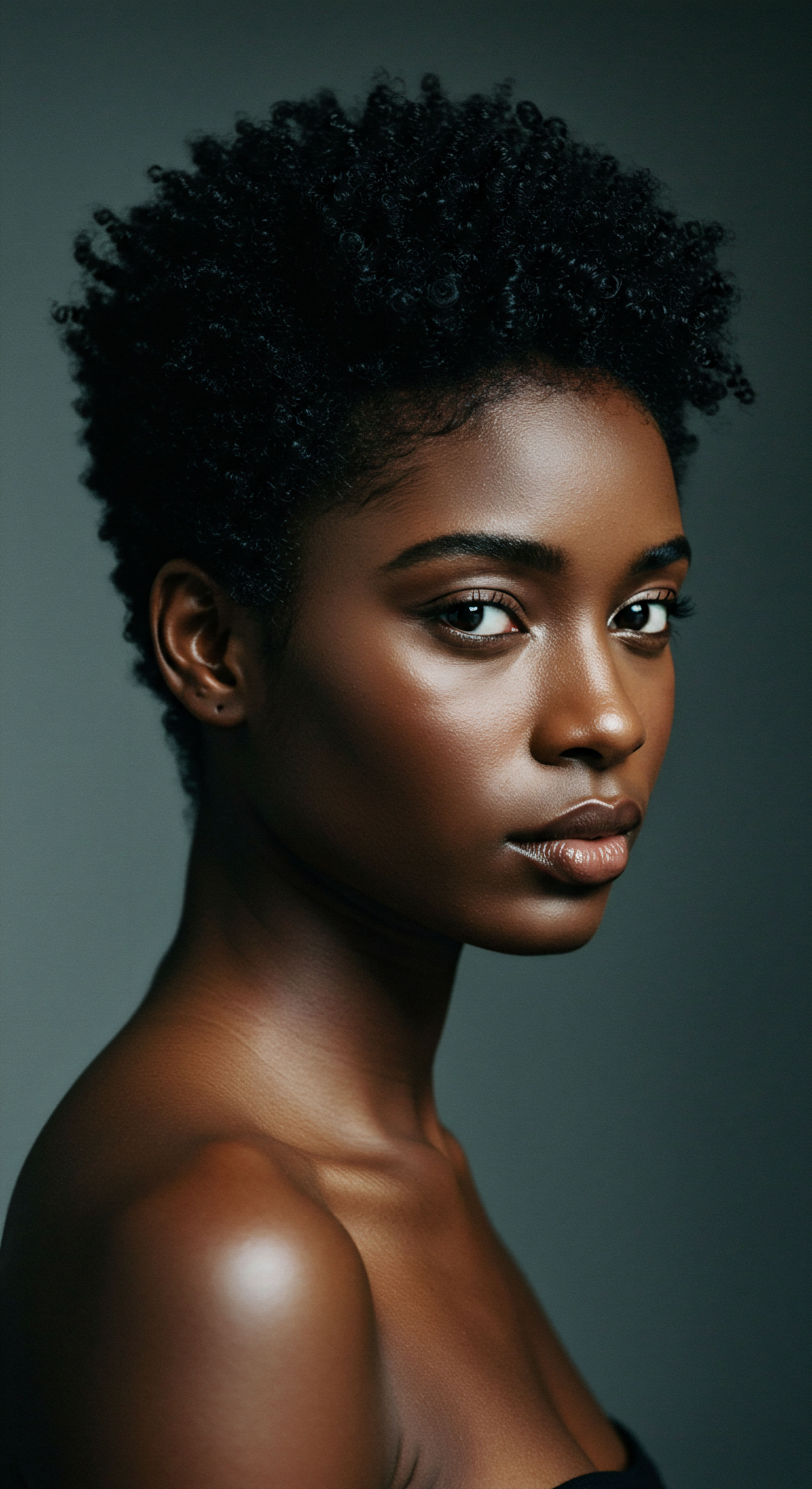
Daily Habits and Scalp Harmony
The rhythm of our days, from the foods we select to the quality of our rest, subtly guides the health of our scalp. An absence of sleep, for instance, has a notable impact on skin, including the scalp. Studies indicate that sleep deprivation can impair the skin’s barrier function, leading to increased transepidermal water loss and a reduction in skin hydration.
This dehydration can contribute to a dry, irritated scalp. Furthermore, inadequate sleep can elevate cortisol levels, a stress hormone, which in turn triggers the skin to produce more sebum, potentially leading to inflammation or an oily scalp.
The unseen rhythms of rest and sustenance guide our scalp’s daily comfort.
Hydration extends beyond what we drink. The skin’s barrier, including that of the scalp, requires sufficient moisture to function optimally. When this barrier is compromised, it becomes more susceptible to external irritants, leading to stinging, tingling, and itching.
Regular cleansing with gentle, sulfate-free shampoos, coupled with proper hydration, helps maintain scalp health. Avoiding harsh products that strip natural oils is also important.

The Plate’s Influence on Scalp Sensation
What we choose to place on our plates directly communicates with our scalp. The relationship is direct and discernible. Foods that can disrupt hormonal balance or promote inflammation are often linked to scalp issues.
Sugary foods, for example, can contribute to inflammation, potentially worsening conditions like dandruff. Processed foods, often laden with unhealthy fats and preservatives, can also upset the delicate internal equilibrium that impacts scalp health.
Conversely, a thoughtful approach to diet can offer immense comfort.
- Whole Grains ❉ Oats and other whole grains provide B-vitamins, which play a role in the hair growth cycle. Deficiencies in these vitamins can be associated with hair loss.
- Lean Protein ❉ Essential for the structural integrity of hair fibers and overall follicular health. Eggs, fish, and nuts are excellent sources.
- Healthy Fats ❉ Omega-3s, found in fatty fish, chia seeds, and walnuts, are anti-inflammatory and nourish the scalp from within.
The concept of “subclinical” or “covert” nutritional deficiencies is particularly compelling here. These are hidden shortages that might not be immediately obvious but can manifest when the body faces increased demand, such as from stress or illness. Such deficiencies can impact numerous cellular functions, including those critical for scalp health. This suggests that even without overt symptoms, a diet lacking in specific micronutrients could be silently undermining scalp comfort.

Does a Balanced Diet Truly Affect Scalp Sensitivity?
Yes, a balanced diet has a significant influence on scalp sensitivity. The presence of adequate nutrients ensures the scalp’s barrier function remains robust, protecting against irritants and reducing susceptibility to inflammatory responses. For instance, omega-3 fatty acids help maintain a healthy scalp by reducing inflammation, which is essential for optimal hair growth and overall scalp comfort.
When the body lacks these vital elements, the scalp can become more reactive, leading to sensations of itchiness, dryness, or irritation. The connection between our dietary choices and the tactile experience of our scalp is a testament to the body’s integrated nature.
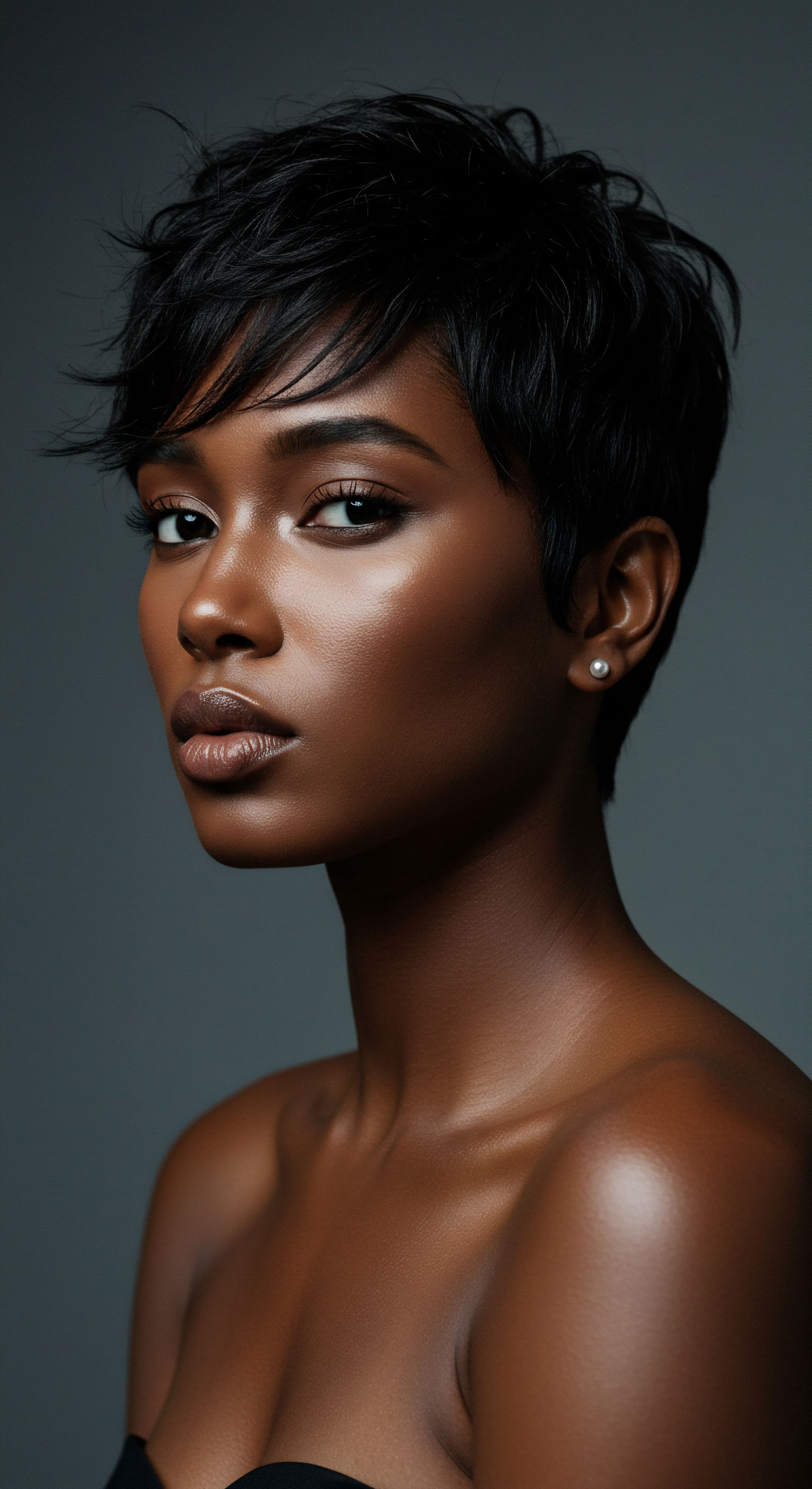
Relay
Stepping deeper into the interplay between our internal landscape and scalp comfort, we encounter a sophisticated network where biological systems, environmental factors, and even cultural legacies converge. This section explores the more intricate, sometimes surprising, ways in which diet and lifestyle choices reverberate through our bodies to influence the very foundation of our hair. Here, we transcend surface-level discussions to consider the nuanced connections that shape our scalp’s well-being, drawing upon research and less commonly explored data points.
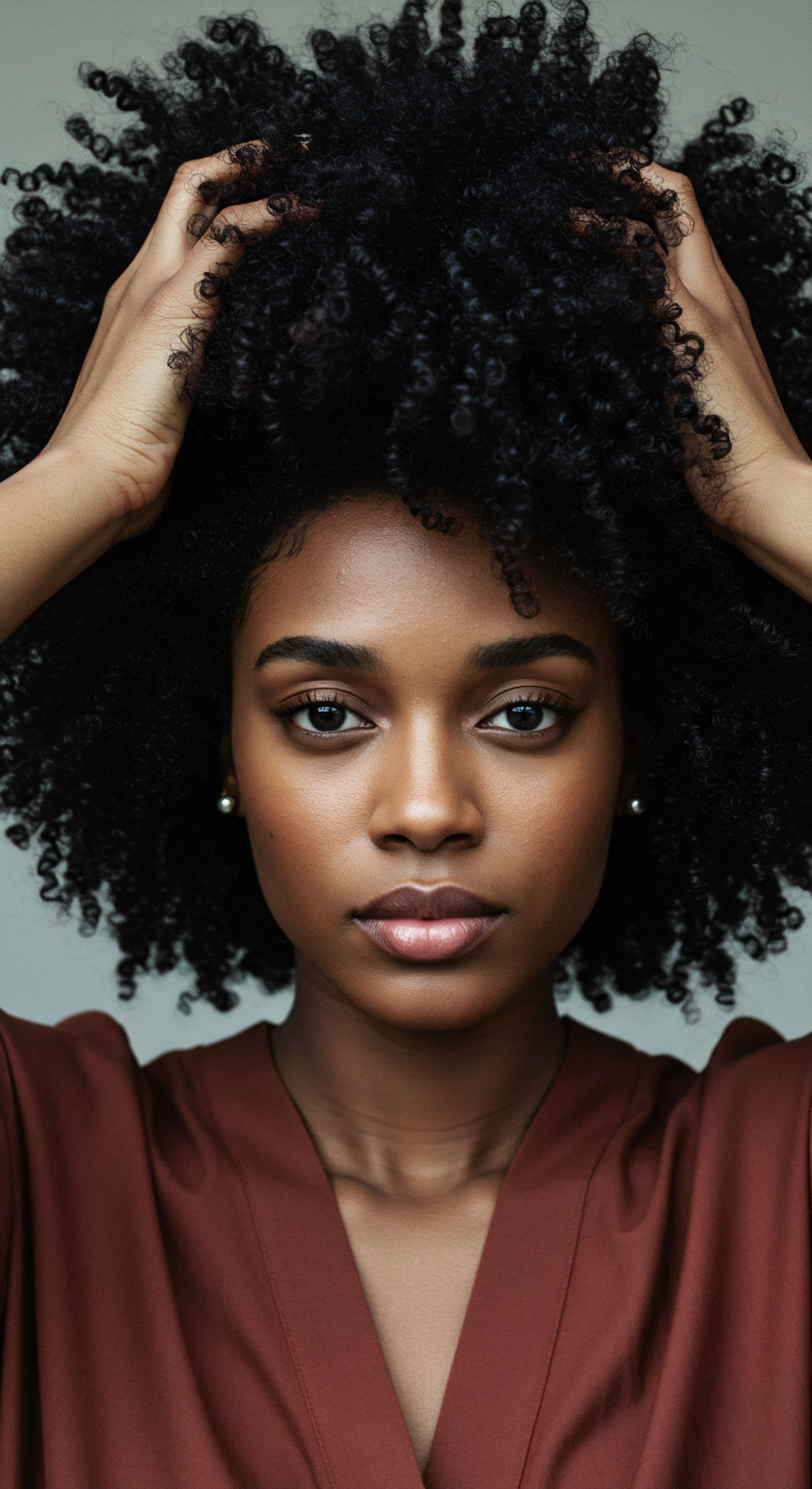
The Gut-Scalp Axis
A particularly fascinating area of modern inquiry is the gut-skin axis, which extends to the scalp. The gut microbiome, a diverse community of microorganisms within our digestive system, plays a vital role in overall wellness, including nutrient absorption and immune function. An imbalanced gut microbiome can impair the absorption of essential nutrients needed for healthy hair and scalp, such as biotin and vitamin B12. Disruptions in the gut microbiome, known as gut dysbiosis, have been linked to various forms of alopecia, underscoring the profound connection between digestive health and scalp conditions.
Consider a compelling piece of research ❉ a systematic review and meta-analysis on the efficacy of probiotics in hair growth and dandruff control. This review found that oral probiotic supplementation relieved scalp itching in 73.1% of participants over 12 weeks of treatment. This striking figure suggests that influencing the gut’s microbial balance can have a direct, tangible effect on scalp sensations, even for issues as common as itching. This particular data point, often overshadowed by discussions of topical treatments, underscores the internal origins of many scalp discomforts.
The subtle hum of our gut health profoundly influences the tranquility of our scalp.
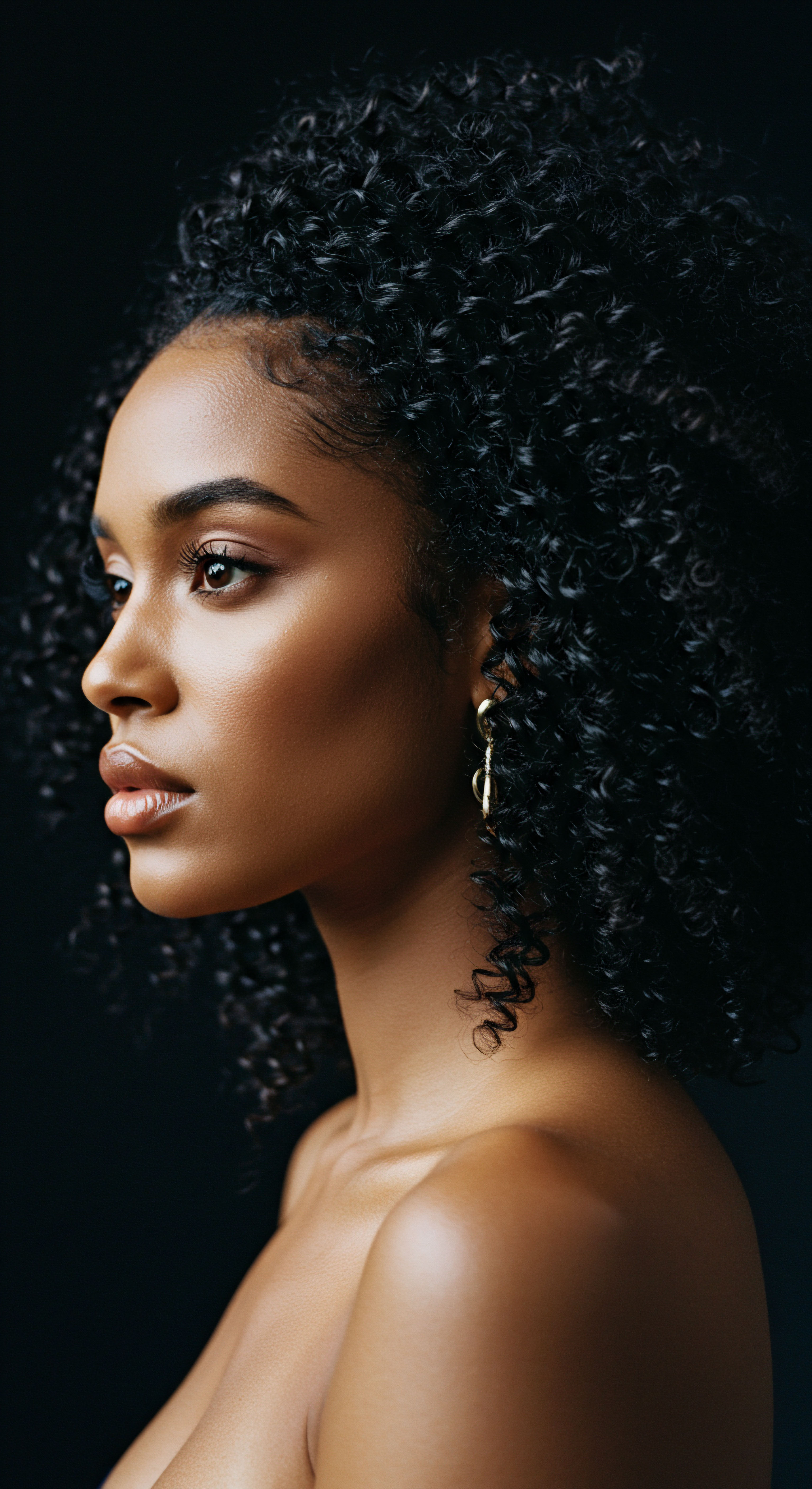
Hormonal Choreography and Scalp Response
Hormones act as powerful chemical messengers, orchestrating countless bodily functions, including the hair growth cycle, follicular health, and overall scalp condition. Elevated cortisol levels, often a result of chronic stress or insufficient sleep, can disrupt hormonal balance. This disruption can lead to increased sebum production, a compromised scalp barrier, and heightened inflammation, all contributing to scalp discomfort and potential hair shedding.
For instance, the reduction in estrogen as women approach menopause can lead to a dry, itchy scalp and a weaker barrier function, making the scalp more sensitive and prone to irritation. This highlights how significant life stages, mediated by hormonal shifts, directly impact scalp comfort, and how lifestyle choices that support hormonal equilibrium can offer relief.
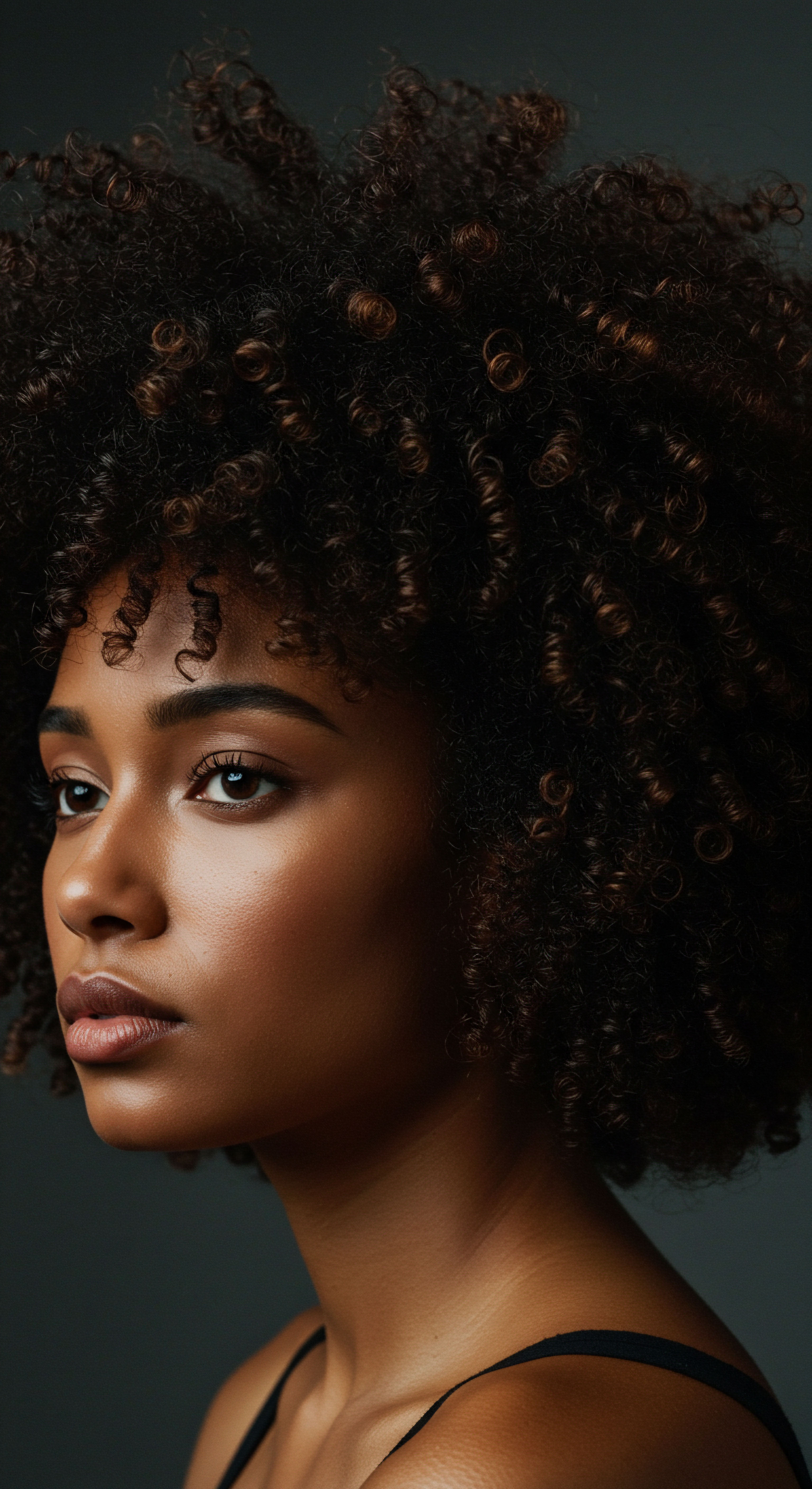
Can Cultural Dietary Traditions Influence Scalp Conditions?
Indeed, cultural dietary traditions can significantly influence scalp conditions, often through long-standing practices and beliefs about food’s impact on the body. While not always directly about scalp comfort, these traditions shape nutrient intake and overall physiological states. For example, some traditional beliefs might advocate for avoiding certain foods, like eggs or milk, during specific life stages, such as pregnancy, due to concerns about their perceived effects on the baby. Such dietary restrictions, if not carefully managed, could inadvertently lead to nutrient deficiencies that impact scalp health.
Conversely, other traditions may incorporate specific oils or plant-based foods, like shea butter or coconut oil, which science now recognizes for their beneficial fatty acids and antioxidants that reduce protein loss and strengthen hair. This dual perspective reveals how ancestral knowledge, intertwined with modern nutritional understanding, can offer pathways to improved scalp vitality.
The connection between lifestyle factors, including diet and stress, and the scalp microbiome is increasingly understood. Diets rich in fats and sugars can provide energy for pro-inflammatory microbes on the scalp, while probiotics may support the proliferation of beneficial species. Chronic stress weakens immune defenses and alters microbial communities, further influencing scalp conditions. This complex interplay means that our choices, from what we eat to how we manage daily pressures, are relayed directly to the scalp, influencing its delicate balance and our comfort.

Reflection
The exploration of scalp comfort, seen through the lens of diet and lifestyle, ultimately reveals a deeper truth ❉ our bodies are interconnected systems, where every choice, however small, sends ripples throughout. The whispers of a dry patch, the persistent itch, or the subtle changes in texture are not isolated incidents but messages from an intelligent, responsive ecosystem. To seek true scalp comfort is to engage in a holistic conversation with our being, listening to its needs, and providing the nourishment and care that extends beyond the visible strand. It is a gentle reminder that beauty, in its most authentic form, springs from a place of profound inner harmony.
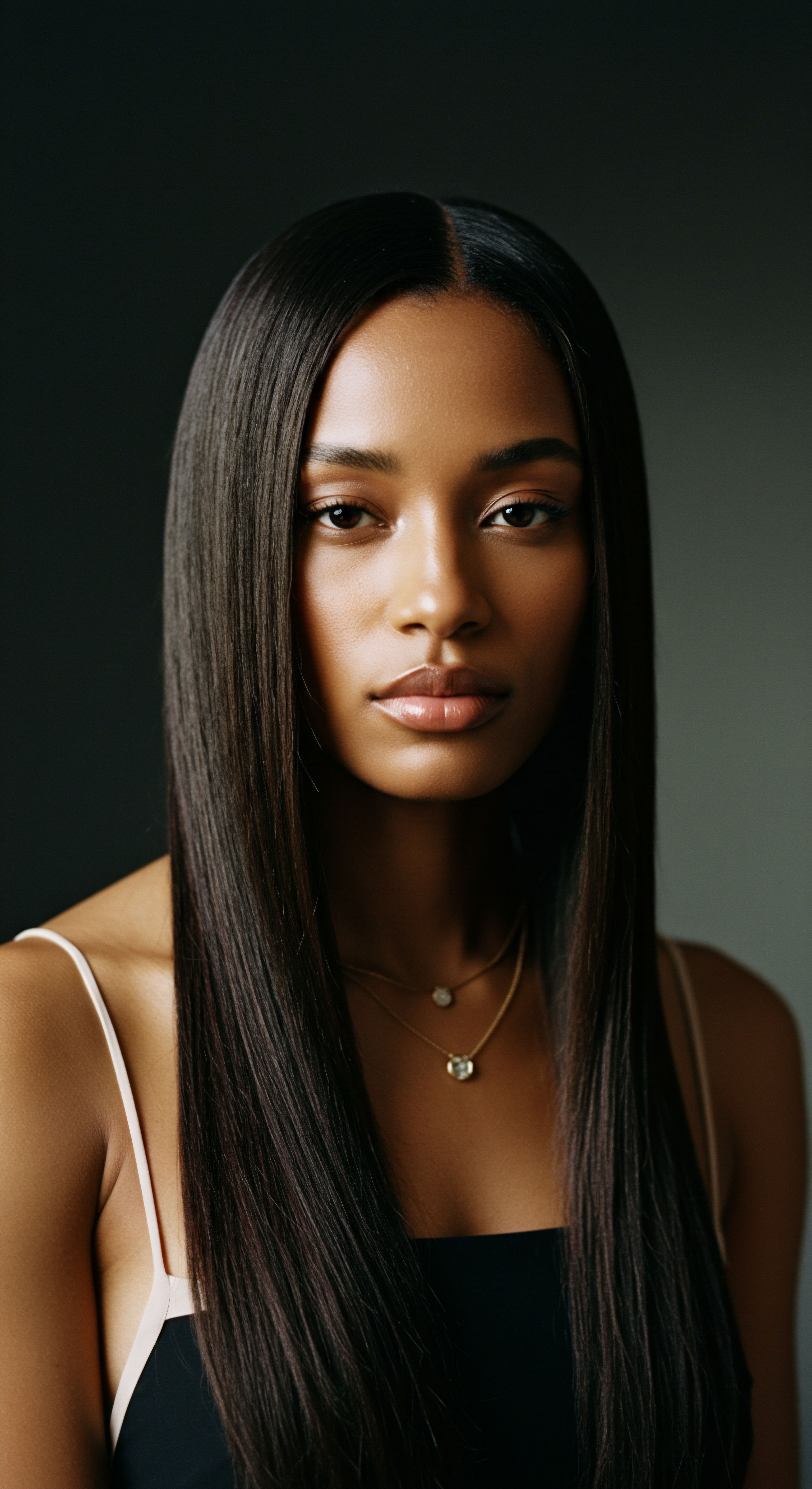
References
- Scalp Microbiome Explained ❉ What’s Living on Your Scalp and Why It Matters. (2025).
- How Can Your Diet Affect Scalp Health? Introducing a Healthy Diet. (2024).
- How Sleep Affects The Skin – Art of Dermatology | New York – Dr. Jessica Krant. (2023).
- Stress & Your Scalp ❉ Head Spa Solutions for Hair Health. (2025).
- How do cultural differences in hair care practices affect hair health and growth? – Quora. (2025).
- How Lack Of Sleep Impacts Your Hair And Skin – Re’equil. (2020).
- Understanding Scalp Health ❉ Key Factors and Treatment Options – Hilaris Publisher. (2024).
- How Can Gut Health Influence Hair Health? – Treatment Rooms London. (2024).
- The Connection Between Hormones and Hair Loss ❉ Estrogen’s Role – BIANCA CLINIC.
- Scalp and hair problems| About dry and itchy scalp – EUCERIN.
- Is your scalp stressed? Tackle it with these tips before it messes with your hair – Healthshots. (2023).
- Understanding Scalp Sebum | Dermal Therapy AU. (2025).
- What is Scalp Sebum? And How to Control It – Pulse Light Clinic. (2024).
- Efficacy of probiotics in hair growth and dandruff control ❉ A systematic review and meta-analysis – PubMed Central.
- The sebum secretion is decreased in human scalp after using heat-killed. – ResearchGate.
- 7 signs of hair texture changes that could indicate a deficiency – Cibdol. (2023).
- How Stress Affects Your Skin ❉ Expert Dermatologist Advice and Solutions – Dermatology of Seattle & Bellevue.
- Dry Scalp ❉ Causes, Treatment & Prevention – Cleveland Clinic. (2022).
- Can lack of sleep trigger eczema? – Skin Shop.
- The Impact of Sleep on Skin Health – Paradise Valley Dermatology. (2024).
- The Connection Between Stress and Scalp Health – The Abode Salon. (2025).
- 10 Vitamin Deficiencies That Are Linked To Hair Loss – The Independent Pharmacy. (2023).
- Study on the use of omega-3 fatty acids as a therapeutic supplement in treatment of psoriasis – PubMed Central. (2011).
- Vitamin D Hair Loss ❉ Causes, Symptoms & Treatment Guide – Aventus Clinic. (2024).
- This is what your scalp reveals about your health! – Cotswold Trichology.
- (PDF) Diet and hair loss ❉ effects of nutrient deficiency and supplement use – ResearchGate. (2024).
- Cultural Practices in Immigrant Populations and their Relevance to Dermatology.
- Omega-3 fatty acids and quality of life in psoriasis ❉ An open, randomised controlled study – Our Dermatology Online. (2018).
- A Scientific Hypothesis on the Role of Nutritional Supplements for Effective Management of Hair Loss and Promoting Hair Regrowth.
- Hair and Scalp Conditions – GroHair Trichology Clinic.
- Integrative and Mechanistic Approach to the Hair Growth Cycle and Hair Loss – MDPI.
- Scalp Health ❉ Why It Matters and How to Maintain It – Aromaganic.
- Incredible Use of Omega-3 Fatty Acids ❉ A Review on Current Use and Future Prospective. (2024).
- How to Keep Sebum in Balance (Why It’s Important for Skin, Hair) – Dr. Axe. (2021).
- The Effects of Sleep Deprivation on the Biophysical Properties of Facial Skin.
- Scalp Health and Disease Prevention ❉ The Role of Nutrition and Lifestyle Factors.
- Study on the use of omega-3 fatty acids as a therapeutic supplement in treatment of psoriasis – PubMed.
- Study on the use of omega-3 fatty acids as a therapeutic supplement in treatment of psoriasis – ResearchGate. (2024).
- Does a Vitamin D Deficiency Age Your Hair? | AllThingsBeauty.
- Cultural food practices and sources of nutrition information among pregnant and postpartum migrant women from low – PubMed Central. (2024).
- Scalp Microbiome. The hidden ecosystem | wai – Wellness Access Institute. (2022).
- The Effect of an Oral Probiotic Mixture on Clinical Evolution and the Gut and Skin Microbiome in Patients with Alopecia Areata ❉ A Randomized Clinical Trial – MDPI.
- Exploring the Gut Microbiome and Metabolome in Individuals with Alopecia Areata Disease.
- Comparative analysis of scalp and gut microbiome in androgenetic alopecia ❉ A Korean cross-sectional study – PubMed Central. (2022).
- A dermatologist reveals the vitamin deficiency that cause hair loss – Miiskin.
- 15 Best Foods for Hair Growth and Thickness, According to Dietitians – Good Housekeeping. (2024).
- Alopecia and the Microbiome ❉ A Future Therapeutic Target? | Actas Dermo-Sifiliográficas.
- Human nutrition – Cultural Adaptation, Dietary Habits, Nutrition Education | Britannica. (2025).